“More research” is necessary to definitively determine the protective efficiency of cloth masks against the Chinese virus, a report in the U.S. Centers for Disease Control and Prevention’s (CDC) Emerging Infectious Diseases journal recently noted.
A report published in the peer-reviewed journal’s October 2020 edition indicated that there is no conclusive evidence showing cloth masks help protect users against the coronavirus, suggesting the science on the subject is not yet settled.
The authors wrote:
More research on cloth masks is needed to inform their use as an alternative to surgical masks/respirators in the event of shortage or high-demand situations. To our knowledge, only 1 randomized controlled trial has been conducted to examine the efficacy of cloth masks in healthcare settings, and the results do not favor use of cloth masks.
More randomized controlled trials should be conducted in community settings to test the efficacy of cloth masks against respiratory infections.
In the report, the authors warned that cloth masks could provide users with a “false sense of protection.”
“The general public should be educated about mask use because cloth masks may give users a false sense of protection because of their limited protection against acquiring infection,” they noted.
Still, CDC has recommended cloth masks for public use, urging Americans to reserve the critical supply of the more effective medical and N-95 respirator face coverings for medical first responders, citing limited availability.
“We are not defenseless against COVID-19,” CDC Director Dr. Robert R. Redfield declared in July. “Cloth face coverings are one of the most powerful weapons we have to slow and stop the spread of the virus – particularly when used universally within a community setting.”
Uncertainty as to cloth masks’ efficacy was a common theme throughout the report, with the authors suggesting they may or may not protect users.
Echoing other statements on the subject, the authors wrote, “Cloth masks may provide some protection if well designed and used correctly.”
“Cloth masks may be used to prevent community spread of infections by sick or asymptomatically infected persons, and the public should be educated about their correct use,” they added.
According to the authors, cloth masks are the least effective face barrier against respiratory infections like COVID-19.
“The filtration effectiveness of cloth masks is generally lower than that of medical masks and respirators,” they wrote, adding:
During a pandemic, cloth masks may be the only option available; however, they should be used as a last resort when medical masks and respirators are not available. Cloth mask use should not be mandated for healthcare workers, but some may choose to use them if there are no alternatives.
The CDC has flip-flopped several times now on whether airborne transmission of the Chinese virus is possible.
After ruling it so late in September, the CDC changed its mind again earlier this month.
A CDC webpage now says that although close contact remains the principal mode by which people contract the virus, airborne transmission is “sometimes” possible, albeit “under special circumstances.”
Referring to airborne transmission, the CDC noted in a separate webpage:
These transmission events appear uncommon and have typically involved the presence of an infectious person producing respiratory droplets for an extended time (>30 minutes to multiple hours) in an enclosed space. Enough virus was present in the space to cause infections in people who were more than 6 feet away or who passed through that space soon after the infectious person had left.
Staying six feet apart or sometimes less is the basis for social distancing rules across the world.
The American Society for Microbiology recently published the results of a study that found the protective efficiency of face masks against airborne transmission of the Chinese virus “is unknown.”
“Recommendations to wear masks to protect the wearer from droplet infections are based on the assumption that droplets travel short distances only,” the CDC journal said.
“The filtration, effectiveness, fit, and performance of cloth masks are inferior to those of medical masks and respirators,” it concluded, later adding, “Cloth masks are a more suitable option for community use when medical masks are unavailable.”

COMMENTS
Please let us know if you're having issues with commenting.